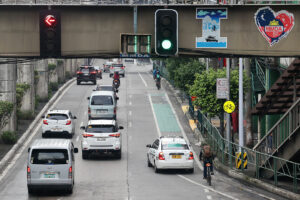




Philippines Trade Update: Imports weaken on tepid demand
 DOWNLOAD
DOWNLOAD

Policy Rate Updates: BSP outlook — cloudy with a chance of rate cut
 DOWNLOAD
DOWNLOAD

January Economic Update: Growth slows, prices rise
 DOWNLOAD
DOWNLOAD


Revamp of vehicle tax needed — IMF

THE PHILIPPINES should consider revamping the taxation of passenger vehicles to take into consideration their impact on the environment, the International Monetary Fund (IMF) said.
In a report, the IMF said the Philippines should conduct a thorough review of the tax treatment of passenger vehicles.
“Moving away from a luxury tax (like the long phased-out value-added tax on luxury goods) to an environment tax (one-off registration tax or excise, potentially coupled with recurrent circulation tax, akin to the current motor vehicle road user charge), ideally taking into account both (carbon dioxide) emissions and road congestion, should be favored,” the IMF said.
The Philippines should conduct an assessment of the revenue impact of this policy change before implementation, it said.
“From 2003, the Philippines moved away from taxing passenger cars based on the engine size (a proxy of negative externalities related to the adverse impact on the environment and roads’ wear and tear) towards a tax on the value of cars,” the IMF said.
However, the IMF said this type of tax compromises the main objective of a “Pigouvian tax — reducing consumption of goods with negative externalities, and the ease of enforcing an excise tax which is usually based on objective and easily measured criteria.”
It noted that low-value cars, most often old models, may be more damaging to the environment, infrastructure and traffic safety than new vehicles.
Despite the “commendable” reforms under Republic Act No. 10963 or the Tax Reform for Acceleration and Inclusion (TRAIN) law, the IMF said “changes in the taxation of passenger vehicles should be revisited.”
Under TRAIN, automobile taxes were adjusted based on the net manufacturing or importer’s price. The tax rate is 4% of the manufacturing or importer’s price for automobiles worth up to P600,000; 10% for automobiles with more than P600,000 but below PHP 1 million; 20% for automobiles above PHP 1 million but below PHP 4 million; and 50% for automobiles above PHP 4 million.
Pickup trucks and purely electric vehicles are currently exempt, while hybrid cars are taxed at 50% of the equivalent automobile.
In August, the House Ways and Means Committee approved the fourth package of the Comprehensive Tax Reform Program, which includes the removal of the excise tax exemption on pickup trucks.
The removal of the excise tax exemption on pickup trucks is projected to generate PHP 52.6 billion worth of additional revenues from 2022 to 2026, according to the Finance department.
However, automakers have opposed the measure, saying this would hurt the automotive industry’s sales and also local businesses that use pickups.
The IMF said there are many tax measures proposed by the previous administration that the current government should consider for implementation.
“The measures include those related to VAT (value-added tax) base broadening, upward adjustment of traditional excises, and potential plans to adopt carbon taxation,” it said.
“Further refining of excise taxation, including on energy products, eliminating exemptions on motorcycles, and introducing a recurrent motor vehicle tax are viable options for revenue mobilization and improved efficiency.”
The Department of Finance under the Duterte administration had proposed a fiscal consolidation and resource mobilization plan, which it said was needed to address the government’s PHP 3.2-trillion debt incurred during the pandemic.
Among the proposed measures are the deferment of the personal income tax reduction under TRAIN, excise tax on single-use plastic and luxury goods, as well as imposition of VAT on digital service providers and a carbon tax.
It also proposed reforming the motor vehicle road user charge, which involves the imposition of a single and unitary rate based on the gross vehicle weight of all motor vehicles. — L.M.J.C.Jocson
This article originally appeared on bworldonline.com





 By BusinessWorld
By BusinessWorld